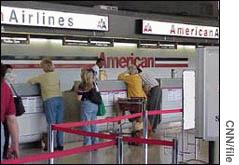|
Fare cuts a tough sell
|
 |
October 4, 2001: 1:52 p.m. ET
Business travel groups say restrictions, security, not fares, keep fliers home
By Staff Writer Chris Isidore
|
NEW YORK (CNNfn) - Air fare discounts being offered by the nation's largest carriers and aimed at business travelers will have limited impact on getting those reluctant customers back into the air, experts say.
The fare cuts announced by UAL Corp. (UAL: down $0.68 to $18.65, Research, Estimates) unit United Airlines, AMR Corp.'s (AMR: down $0.97 to $21.15, Research, Estimates) American Airlines, and Delta Air Lines (DAL: down $1.42 to $27.94, Research, Estimates), along with their competitors this week, continue to carry some of same the restrictions that normally keep business travelers away.
| |

|
|
Business travel experts say the new lower fares will do more to attract leisure travelers than business fliers, due to continued restrictions on tickets. | |
Delta, which announced its fare cuts Thursday, requires only a seven day advance ticket purchase, but it still requires a Saturday night stay for many trips.
Thursday afternoon, United announced cuts for leisure travelers through Oct. 8 in addition to a previously announced business fare reduction.
These fares also require a seven day advance ticket purchase and a Saturday night stay. A 10 percent discount is offered for tickets purchased on the company's Web site.
American, which announced its business fare cuts earlier this week, is requiring a 21-day advance purchase for its 50 percent fare cut, although it drops the Saturday night stay requirement. United's business fare sale has the same requirements.
Trade groups which represent business travelers say those restrictions limit the new fares' usefulness to business travelers.
"In general, business travelers plan travel at the last minute," said Kevin Mitchell of the Business Travel Coalition. "In the aftermath of Sept. 11, many waiting are now waiting until the very, very last minute. There's uncertainty what our response will be militarily and concerns whether business partners will decide to make a trip. To put out there a 50 percent discount, but require a 21-day advance purchase, is totally pointless and misses the goal of getting business travelers back."
Tom Parsons, founder of Bestfares.com, said there are shorter advance ticket purchases offered by smaller carriers which some major carriers are matching in certain markets.
For example Southwest Airlines (LUV: up $0.01 to $15.80, Research, Estimates) is offering its discount fares for a three-day advance with only one day stay-over, not necessarily a Saturday. American Trans Air (AMTR: up $0.03 to $8.11, Research, Estimates) requires no advanced purchase or overnight stay for its cheapest rate.
But Parsons said for the most part many business travelers will fail to benefit from the discounts due to ticket restrictions.
"I don't know who they (the lower fares) are directed at," he said. "It's sure not directed at the Fortune 500 travelers."
Security major concern for fliers
Allison Marble of the National Business Travel Association agreed the fares don't yet answer business traveler's concerns, although she referred to them as a "good first step." She said while it's security concerns more than money keeping business travelers grounded, but notes that price remains a factor in getting them back in the air.
"Some companies are pulling back for economic circumstances since the attack," she said.
Airline consultant Michael Boyd, president of Boyd Group Aviation in Evergreen, Colo., said airlines may be giving up much-needed revenue by offering discounts at a time when economic concerns are still secondary in most people's decision to fly.
"Right now people who are flying are flying because they absolutely have to," said Boyd. "This may dilute revenue more than add to it."
Mitchell also agrees that price is not the primary factor keeping business travelers at home.
"Right now the preponderance of companies have a mission-critical, customer-critical policy in place in regard to travel," he said "People have a real wait-and-see attitude."
United Airlines spokesman Chris Brathwaite said the airline is confident that travel is now safe, and that it's important for airlines to attract key customers, such as business travelers, back as soon as possible so they can see that things are safe again.
"The questions coming in are not so much about price but safety and security," he said. "The system is safe, otherwise the FAA wouldn't have us flying right now. But the customers need to see that."
Click here for a look at airline stocks
But Boyd argues there have been relatively few security improvements, and that attracting customers back right now will only expose them to greater inconvenience without yielding a heightened sense of security.
"Trying to get more people on airplanes is great; [but] they might be showcasing just how bad things are," he said. "It's the same system doing security checks. People haven't been fooled, they still see the same sloppy security." 
|
|
|
|
|
 |

|

